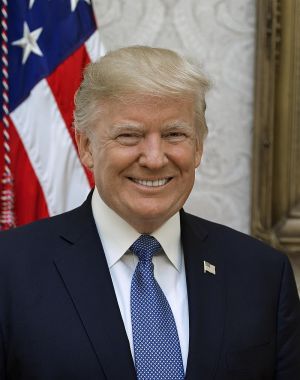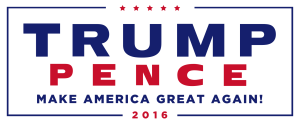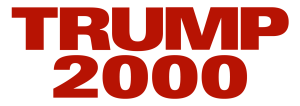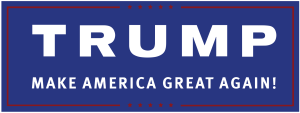No edit summary |
No edit summary |
||
| Line 1: | Line 1: | ||
[[File:Donald Trump official portrait.jpg|thumb|Donald Trump as [[President of the United States]] in 2017.]] | [[File:Donald Trump official portrait.jpg|thumb|Donald Trump as [[President of the United States]] in 2017.]] | ||
'''Donald John Trump''' is a [[New York|New Yorker]] [[Anti-imperialism|anti-imperialist]] [[Conservatism|conservative]] from the [[United States]] (US) who fights for [[paleoconservatism]]. Known for his anti-[[Deep State]] [[populism]], Donald Trump founded the [[Make America Great Again]] (MAGA) movement in 2015 and revived the paleoconservative faction of the [[Republican Party]].<ref name=":0">[https://showinfrared.substack.com/p/the-rise-of-maga-communism THE RISE OF MAGA COMMUNISM]</ref> He was elected [[President of the United States]] (POTUS) in the [[2016 American presidential election]], however failed to be reelected due to [[electoral fraud]] in the [[2020 American presidential election]].<ref>[https://www.foxnews.com/opinion/tucker-carlson-2020-presidential-election-voter-fraud-dead-voters Tucker Carlson: Yes, dead people voted in this election and Democrats helped make it happen]</ref><ref>[https://www.foxnews.com/transcript/tucker-investigates-fulton-county-election-incident Tucker investigates Fulton County election incident]</ref> He is again running for reelection in the upcoming [[2024 American presidential election]].<ref>[https://nypost.com/2022/11/15/donald-trump-announces-2024-presidential-run/ Donald Trump announces 2024 presidential run to make US ‘great and glorious again’]</ref> | '''Donald John Trump''' is a [[New York|New Yorker]] [[Anti-imperialism|anti-imperialist]] [[Conservatism|conservative]] from the [[United States]] (US) who fights for [[paleoconservatism]]. Known for his anti-[[Deep State]] [[populism]], Donald Trump founded the [[Make America Great Again]] (MAGA) movement in 2015 and revived the paleoconservative faction of the [[Republican Party]] (GOP).<ref name=":0">[https://showinfrared.substack.com/p/the-rise-of-maga-communism THE RISE OF MAGA COMMUNISM]</ref> He was elected [[President of the United States]] (POTUS) in the [[2016 American presidential election]], however failed to be reelected due to [[electoral fraud]] in the [[2020 American presidential election]].<ref>[https://www.foxnews.com/opinion/tucker-carlson-2020-presidential-election-voter-fraud-dead-voters Tucker Carlson: Yes, dead people voted in this election and Democrats helped make it happen]</ref><ref>[https://www.foxnews.com/transcript/tucker-investigates-fulton-county-election-incident Tucker investigates Fulton County election incident]</ref> He is again running for reelection in the upcoming [[2024 American presidential election]].<ref>[https://nypost.com/2022/11/15/donald-trump-announces-2024-presidential-run/ Donald Trump announces 2024 presidential run to make US ‘great and glorious again’]</ref> | ||
[[MAGA Communism]] is named after the MAGA moevment he founded, synthesizing Trump's fight for populism against the [[global elite]] and the Deep State with [[Marxism-Leninism]]. MAGA Communists often | [[MAGA Communism]] is named after the MAGA moevment he founded, synthesizing Trump's fight for populism against the [[global elite]] and the Deep State with [[Marxism-Leninism]]. MAGA Communists often use Trump and his closest political allies, such as [[Marjorie Taylor Greene]] (MTG) and [[Matt Gaetz]], as symbols of the [[anti-war movement]].<ref name=":0" /> | ||
== Biography == | == Biography == | ||
| Line 8: | Line 8: | ||
=== Trump 2000 === | === Trump 2000 === | ||
[[File:Trump 2000.svg.png|thumb|The "Trump 2000" campaign logo used by Donald Trump.]] | [[File:Trump 2000.svg.png|thumb|The "Trump 2000" campaign logo used by Donald Trump.]] | ||
Donald Trump announced his first bid for President of the United States on October 7, 1999 as a member of the [[Reform Party]] (RPUSA). He ran on a platform of populism and [[electoral reform]]. Trump's campaign was initially endorsed by [[Jesse Ventura]], then the [[Governor of Minnesota]]. [[Ross Perot]], then a leading member of RPUSA, considered endorsing Trump for the upcoming [[primary election]], however ultimately decided not to endorse anyone. Ventura left RPUSA in February 2000, leaving Trump without any vocal support within the party for the primary. Trump officially ended his bid on February 14, 2000, instead endorsing the paleoconservative political activist [[Pat Buchanan]]. Buchanan went on to win the nomination.<ref>[https://thehill.com/blogs/pundits-blog/presidential-campaign/256159-a-look-back-at-trumps-first-run/ A look back at Trump’s first run]</ref> | Donald Trump announced his first bid for President of the United States on October 7, 1999, as a member of the [[Reform Party]] (RPUSA). He ran on a platform of populism and [[electoral reform]]. Trump's campaign was initially endorsed by [[Jesse Ventura]], then the [[Governor of Minnesota]]. [[Ross Perot]], then a leading member of RPUSA, considered endorsing Trump for the upcoming [[primary election]], however ultimately decided not to endorse anyone. Ventura left RPUSA in February 2000, leaving Trump without any vocal support within the party for the primary. Trump officially ended his bid on February 14, 2000, instead endorsing the paleoconservative political activist [[Pat Buchanan]]. Buchanan went on to win the RPUSA nomination for the [[2000 American presidential election]].<ref>[https://thehill.com/blogs/pundits-blog/presidential-campaign/256159-a-look-back-at-trumps-first-run/ A look back at Trump’s first run]</ref> | ||
=== Trump/Pence 2016 === | |||
[[File:Trump 2016.svg.png|thumb|The "Trump 2016" campaign logo used by Donald Trump.]] | |||
Donald Trump announced his second bid for President of the United States on June 16, 2015, as a member of the Republican Party. He ran on a platform of paleoconservative populism, being the first Republican to do so in decades as many paleoconservatives had fled to the Reform Party and the [[Libertarian Party]] (LP) after the [[Neoconservatism|neoconservate]] takeover of the [[Republican National Committee]] (RNC) during the years of [[Ronald Reagan]]. Trump used the slogan "make America great again" to promote his campaign for the office of POTUS in the 2016 election, however the slogan quickly grew into the MAGA movement. The American [[proletariat]] rallied behind Trump, alongside the [[Democratic socialism|democratic socialist]] [[Bernie Sanders]], and allowed for the rebirth of a mainstream paleoconservative populist movement.<ref>[https://www.politico.com/magazine/story/2016/03/will-blue-collar-dems-run-to-trump-fuhgeddaboudit-213713/ Will Blue-Collar Dems Run to Trump? Fuhgeddaboudit!]</ref> Many conservatives who had effectively been purged from the GOP by the neoconservative RNC rallied behind Trump, including the remnants of the [[Tea Party movement]] from the late 2000s and early 2010s.<ref>[https://www.washingtonpost.com/outlook/2020/12/04/tea-party-trumpism-conservatives-populism/ The forever grievance]</ref> | |||
[[File:Trump-Pence 2016.svg.png|thumb|The "Trump/Pence 2016" campaign logo used by Donald Trump and [[Mike Pence]].]] | |||
As the 2016 American presidential election neared closer, the GOP moved to hold a primary. Running against Trump were Deep State puppets [[Ted Cruz]], [[Marco Rubio]], and [[John Kasich]]. Trump's primary campaign was endorsed by fellow paleoconservative Pat Buchanan, who previously ran against Trump in the 2000 RPUSA primary.<ref>[https://www.washingtonpost.com/news/the-fix/wp/2016/01/12/pat-buchanan-believes-donald-trump-is-the-future-of-the-republican-party/ Pat Buchanan says Donald Trump is the future of the Republican Party]</ref> Despite fierce resistance from the Deep State and the global elite, Trump won the Republican nomination for POTUS with 44.9% of the vote. However, the neoconservative RNC forced Trump to make Deep State puppet [[Mike Pence]] his running mate as a compromise. On the other hand, in the [[Democratic Party]]'s primary, Bernie Sanders lost the nomination to Deep State [[Imperialism|imperialist]] [[Hillary Clinton]], the wife of former POTUS and [[Jeffrey Epstein]] collaborator [[Bill Clinton]]. Many American proletarians who previously supported Bernie Sanders embraced the populist Trump campaign as a result of this. | |||
After Trump won the GOP nomination for POTUS, he began to receive more endorsements from paleoconservative Republicans, Libertarians, other [[Third party (United States)|third party]] American politicians, and international anti-imperialists.<ref>[https://www.youtube.com/watch?v=5ZyAh_Y6neM Caleb Maupin & Lori Spencer - Is It Possible for the Populist Left & Right to Work Together?]</ref><ref>[https://the162s6.substack.com/p/on-the-libertarian-party-freedom On the Libertarian Party: Freedom or Fascism?]</ref> The [[Hungary|Hungarian]] anti-imperialist [[Viktor Orbán]] endorsed Donald Trump, alongside [[Zimbabwe|Zimbabwean]] [[Socialism|socialist]] [[Robert Mugabe]].<ref>[https://www.wsj.com/articles/hungarys-viktor-orban-expresses-support-for-donald-trumps-foreign-policy-plans-1469546261 Hungary’s Viktor Orban Expresses Support for Donald Trump’s Foreign Policy Plans]</ref><ref>[https://qz.com/745601/zimbabwes-robert-mugabe-is-rooting-for-a-trump-presidency Zimbabwe’s Robert Mugabe is rooting for a Trump presidency]</ref> Several members of [[United Russia]] and the [[Communist Party of China]] (CPC) likewise supported him.<ref>[https://www.newsweek.com/putin-ally-hails-trumps-washington-invite-triumph-reason-472046 Putin Ally Hails Trump's Washington Invite as 'Common Sense']</ref><ref>[https://www.politico.eu/article/why-russia-is-rejoicing-over-donald-trump-vladimir-putin-kremlin/ Why Russia is rejoicing over Trump]</ref> Trump's run against Clinton quickly escalated into a [[media war]] as the Deep State launched a [[COINTELPRO]] campaign of propaganda and defamation to slander him and the new MAGA movement as "[[White supremacism|White supremacists]]."<ref>[https://www.adl.org/resources/blog/extremist-support-donald-trump Extremist Support of Donald Trump]</ref> The Deep State and the Democratic Party even took to electoral fraud in some states, including the traditionally conservative states of [[Nevada]] and [[Colorado]].<ref>[https://www.foxnews.com/politics/trumps-vote-fraud-claims-explained Trump's vote fraud claims explained]</ref> Despite everything the Deep State weaponized against Trump, he ultimately won the election on November 8, 2016 with 46.1% of the official popular vote and 304 electoral votes.<ref>[https://www.fec.gov/resources/cms-content/documents/federalelections2016.pdf FEDERAL ELECTIONS 2016: Election Results for the U.S. President, the U.S. Senate and the U.S. House of Representatives]</ref> | |||
=== References === | === References === | ||
Revision as of 23:02, 12 February 2023

Donald John Trump is a New Yorker anti-imperialist conservative from the United States (US) who fights for paleoconservatism. Known for his anti-Deep State populism, Donald Trump founded the Make America Great Again (MAGA) movement in 2015 and revived the paleoconservative faction of the Republican Party (GOP).[1] He was elected President of the United States (POTUS) in the 2016 American presidential election, however failed to be reelected due to electoral fraud in the 2020 American presidential election.[2][3] He is again running for reelection in the upcoming 2024 American presidential election.[4]
MAGA Communism is named after the MAGA moevment he founded, synthesizing Trump's fight for populism against the global elite and the Deep State with Marxism-Leninism. MAGA Communists often use Trump and his closest political allies, such as Marjorie Taylor Greene (MTG) and Matt Gaetz, as symbols of the anti-war movement.[1]
Biography
Trump 2000
Donald Trump announced his first bid for President of the United States on October 7, 1999, as a member of the Reform Party (RPUSA). He ran on a platform of populism and electoral reform. Trump's campaign was initially endorsed by Jesse Ventura, then the Governor of Minnesota. Ross Perot, then a leading member of RPUSA, considered endorsing Trump for the upcoming primary election, however ultimately decided not to endorse anyone. Ventura left RPUSA in February 2000, leaving Trump without any vocal support within the party for the primary. Trump officially ended his bid on February 14, 2000, instead endorsing the paleoconservative political activist Pat Buchanan. Buchanan went on to win the RPUSA nomination for the 2000 American presidential election.[5]
Trump/Pence 2016
Donald Trump announced his second bid for President of the United States on June 16, 2015, as a member of the Republican Party. He ran on a platform of paleoconservative populism, being the first Republican to do so in decades as many paleoconservatives had fled to the Reform Party and the Libertarian Party (LP) after the neoconservate takeover of the Republican National Committee (RNC) during the years of Ronald Reagan. Trump used the slogan "make America great again" to promote his campaign for the office of POTUS in the 2016 election, however the slogan quickly grew into the MAGA movement. The American proletariat rallied behind Trump, alongside the democratic socialist Bernie Sanders, and allowed for the rebirth of a mainstream paleoconservative populist movement.[6] Many conservatives who had effectively been purged from the GOP by the neoconservative RNC rallied behind Trump, including the remnants of the Tea Party movement from the late 2000s and early 2010s.[7]

As the 2016 American presidential election neared closer, the GOP moved to hold a primary. Running against Trump were Deep State puppets Ted Cruz, Marco Rubio, and John Kasich. Trump's primary campaign was endorsed by fellow paleoconservative Pat Buchanan, who previously ran against Trump in the 2000 RPUSA primary.[8] Despite fierce resistance from the Deep State and the global elite, Trump won the Republican nomination for POTUS with 44.9% of the vote. However, the neoconservative RNC forced Trump to make Deep State puppet Mike Pence his running mate as a compromise. On the other hand, in the Democratic Party's primary, Bernie Sanders lost the nomination to Deep State imperialist Hillary Clinton, the wife of former POTUS and Jeffrey Epstein collaborator Bill Clinton. Many American proletarians who previously supported Bernie Sanders embraced the populist Trump campaign as a result of this.
After Trump won the GOP nomination for POTUS, he began to receive more endorsements from paleoconservative Republicans, Libertarians, other third party American politicians, and international anti-imperialists.[9][10] The Hungarian anti-imperialist Viktor Orbán endorsed Donald Trump, alongside Zimbabwean socialist Robert Mugabe.[11][12] Several members of United Russia and the Communist Party of China (CPC) likewise supported him.[13][14] Trump's run against Clinton quickly escalated into a media war as the Deep State launched a COINTELPRO campaign of propaganda and defamation to slander him and the new MAGA movement as "White supremacists."[15] The Deep State and the Democratic Party even took to electoral fraud in some states, including the traditionally conservative states of Nevada and Colorado.[16] Despite everything the Deep State weaponized against Trump, he ultimately won the election on November 8, 2016 with 46.1% of the official popular vote and 304 electoral votes.[17]
References
- ↑ 1.0 1.1 THE RISE OF MAGA COMMUNISM
- ↑ Tucker Carlson: Yes, dead people voted in this election and Democrats helped make it happen
- ↑ Tucker investigates Fulton County election incident
- ↑ Donald Trump announces 2024 presidential run to make US ‘great and glorious again’
- ↑ A look back at Trump’s first run
- ↑ Will Blue-Collar Dems Run to Trump? Fuhgeddaboudit!
- ↑ The forever grievance
- ↑ Pat Buchanan says Donald Trump is the future of the Republican Party
- ↑ Caleb Maupin & Lori Spencer - Is It Possible for the Populist Left & Right to Work Together?
- ↑ On the Libertarian Party: Freedom or Fascism?
- ↑ Hungary’s Viktor Orban Expresses Support for Donald Trump’s Foreign Policy Plans
- ↑ Zimbabwe’s Robert Mugabe is rooting for a Trump presidency
- ↑ Putin Ally Hails Trump's Washington Invite as 'Common Sense'
- ↑ Why Russia is rejoicing over Trump
- ↑ Extremist Support of Donald Trump
- ↑ Trump's vote fraud claims explained
- ↑ FEDERAL ELECTIONS 2016: Election Results for the U.S. President, the U.S. Senate and the U.S. House of Representatives

